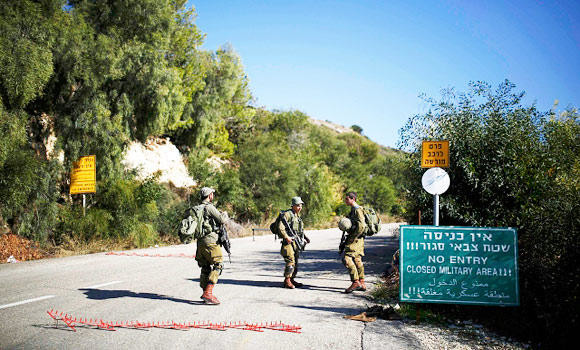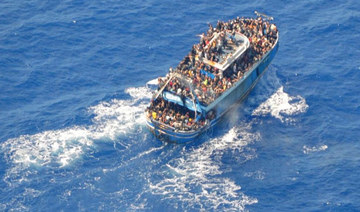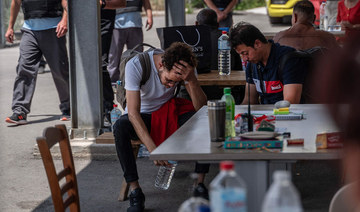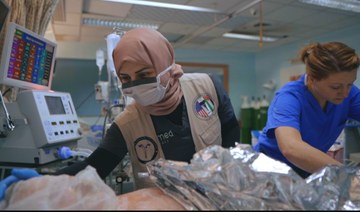JERUSALEM: Israel and Lebanon on Monday rushed to ease tensions following a deadly border skirmish that left one Israeli soldier dead, with the enemy countries holding a face-to-face meeting with UN peacekeepers and pledging their commitment to a seven-year-old cease-fire.
The UN peacekeeping force along the volatile border, UNIFIL, said it called the meeting to “establish the facts and circumstances” behind the flare-up in violence and to restore a cease-fire that has been in place since a 2006 war. It said both sides pledged to preserve “calm and stability.”
In Sunday’s incident, a Lebanese sniper opened fire at an Israeli vehicle traveling near the border area of Rosh Hanikra, killing a soldier inside. Several hours later, the Israeli military said it shot two Lebanese soldiers after spotting “suspicious movement” in the same area. It was the heaviest fighting between the enemy countries in more than three years and drew condemnations and threats of retaliation from Israel.
Late Monday, the Lebanese army distanced itself from the incident, saying the shooting was the result of an “individual act” by a soldier.
It said a military committee was investigating the incident and was coordinating with the UN peacekeeping mission. With the shooter in custody, there was no word on a motive for the attack and no mention of the two soldiers allegedly shot by Israel. The Lebanese army stressed its full commitment to UN resolutions, including maintaining the 2006 cease-fire.
The tame language, and near apology for the incident, was rare for the Lebanese military, which is usually quick to point out Israeli border transgressions. It suggested that Lebanon was keen to avoid a conflagration on its border at a time of severe tensions resulting from the civil war in neighboring Syria.
Likewise, Israeli officials tried to lower the tensions. “The idea is to bring the situation back to normal and not aggravate the situation,” said Lt. Col. Peter Lerner, a military spokesman.
The border has remained mostly quiet since the monthlong war in the summer of 2006, though there have been sporadic outbursts of violence. In the most serious incident, Lebanese forces killed a high-ranking Israeli officer in 2010, claiming the Israeli army had crossed the border while uprooting a tree. Israel responded with artillery fire that killed three Lebanese. Given the years of enmity between the two countries, even the smallest incident raises the risk of sparking a wider conflagration.
The UN Security Council on Monday issued a statement condemning the killing of the Israeli soldier, but noting that “UNIFIL confirmed the Lebanese government’s preliminary findings which indicate that the shooting was an individual action by a soldier.”
Late Monday, UNIFIL said it had convened a meeting of senior Israeli and Lebanese officers at the Naqoura border crossing, near the site of the shooting. UNIFIL’s commander, Maj. Gen. Paolo Serra, and the UN special coordinator for Lebanon, Derek Plumbly, also attended.
In a statement, Serra said preliminary findings indicated the Lebanese sniper had acted alone, in violation of operational rules and procedures. He said the sides discussed “concrete steps” to strengthen security arrangements, and emphasized their interest in preserving “calm and stability.”
“I was encouraged by the discussion at the tripartite meeting and by the way the parties approached the issues at hand,” Serro said. “They affirmed their full commitment to the cessation of hostilities.”
Lebanon and Israel have been officially at war since Israel’s creation in 1948. Each country bans its citizens from visiting the other, and there are no direct trade ties or diplomatic relations.
Their armies do not communicate directly, but in cases of increased tension exchange messages through the UN Face-to-face meetings under UN auspices like Monday’s sporadically take place, Israeli officials said.
The 2006 war broke out after Iranian-backed Hezbollah guerrillas crossed into Israel and captured two Israeli soldiers. The ensuing monthlong conflict killed about 1,200 Lebanese and 160 Israelis.
Hezbollah has an arsenal of tens of thousands of missiles and rockets aimed at Israel, and Israeli officials say it is only a matter of time for renewed fighting against the Shiite militia. But it was not involved in Sunday’s shooting and officials believe it is not interested in fighting at the current time because it is preoccupied with the war in Syria, where it is aiding the forces of President Bashar Assad.
Israel and Lebanon have fought several wars before. In 1982, Israel invaded Lebanon with the stated intention of driving Palestinian guerrillas out of the south. The Israeli military battled halfway through the country into Beirut and occupied south Lebanon until 2000.
The Lebanese are banned from calling or traveling to Israel or having contacts with Israelis. Such an offense is punishable by anything from a few weeks to life in prison with hard labor, depending on the kind and level of contact. All Israeli products are banned in the country, including Israeli films.
Israel restrictions are slightly less stringent, with phone calls to Lebanon and Lebanese film screenings permitted, though it is a punishable offense for an Israeli to visit Lebanon.
The two nation’s carriers do not fly over each other’s airspace. Travelers coming from Israel to Lebanon usually go through Jordan or Egypt. Those with Israeli stamps in their passports are deported, which forces travelers to carry a second passport.
Those who have visited in Lebanon and arrive in Israel are heavily questioned at the border or airport.
___
Associated Press writers Ryan Lucas and Zeina Karam in Beirut, and Daniel Estrin in Jerusalem contributed to this report.
Israel, Lebanon move to ease tensions after border skirmish
Israel, Lebanon move to ease tensions after border skirmish

Greek defense team says 9 Egyptians accused of causing deadly shipwreck were misidentified as crew

- The nine are due to go on trial in Kalamata on May 21 on a series of charges, including migrant smuggling, participation in a criminal organization and causing a deadly shipwreck
- They face multiple life sentences if convicted
ATHENS: The legal defense team for nine Egyptian men due to go on trial in southern Greece next week accused of causing one of the Mediterranean’s deadliest shipwrecks said Thursday they will argue that Greece has no jurisdiction in the case, and insisted their clients were innocent survivors who have been unjustly prosecuted.
The nine, whose ages range from early 20s to early 40s, are due to go on trial in the southern city of Kalamata on May 21 on a series of charges, including migrant smuggling, participation in a criminal organization and causing a deadly shipwreck. They face multiple life sentences if convicted.
The Adriana, an overcrowded fishing trawler, had been sailing from Libya to Italy with hundreds of asylum-seekers on board when it sank on June 14 in international waters off the southwestern coast of Greece.
The exact number of people on board has never been established, but estimates range from around 500 to more than 700. Only 104 people survived — all men and boys from Syria, Egypt, Pakistan and two Palestinians — and about 80 bodies were recovered. The vessel sank in one of the Mediterranean’s deepest areas, making recovery efforts all but impossible.
The Greek lawyers who make up the defense team spoke during a news conference in Athens on Thursday. They maintained their clients’ innocence, saying all nine defendants had been paying passengers who had been misidentified as crew members by other survivors who gave testimonies under duress just hours after having been rescued.
The nine “are random people, smuggled people who paid the same amounts as all the others to take this trip to Italy aiming for a better life, and they are accused of being part of the smuggling team,” lawyer and defense team member Vicky Aggelidou said.
Dimitris Choulis, another lawyer and member of the legal team, said that Greek authorities named the defendants as crew members following testimonies by nine other survivors who identified them for having done things as simple as handing bottles of water or pieces of fruit to other passengers.
“For nearly a year now, nine people have been in prison without knowing what they are in prison for,” Choulis said.
“For me, it is very sad to visit and see people in prison who do not understand why they are there,” he added.
While the Adriana was sailing in international waters, the area was within Greece’s search and rescue zone of responsibility. Greece’s coast guard had been shadowing the vessel for a full day without attempting a rescue of those on board. A patrol boat and at least two merchant ships were in the vicinity when the trawler capsized and sank.
In the aftermath of the sinking, some survivors said the coast guard had been attempting to tow the boat when it sank, and rights activists have accused Greek authorities of triggering the shipwreck while attempting to tow the boat out of Greece’s zone of responsibility.
Greek authorities have rejected accusations of triggering the shipwreck and have insisted the trawler’s crew members had refused to accept help from the nearby merchant ships and from the Greek coast guard.
A separate investigation being carried out by Greece’s naval court hasn’t yet reached any conclusion, and the defense team hasn’t been given any access to any part of it.
The Egyptians’ defense team also argues that because the shipwreck occurred in international waters, Greek courts don’t have jurisdiction to try the case, and the defense will move to have the case dismissed on those grounds when the trial opens in Kalamata next week.
Greece lies along one of the most popular routes into the European Union for people fleeing war and poverty in the Middle East, Africa and Asia. While most of those cross into the country’s eastern Aegean Sea islands from the nearby Turkish coast, others try to skirt Greece altogether and head from north Africa to Italy across the longer and more dangerous Mediterranean route.
On Thursday, Greece’s coast guard said that 42 people had been rescued and another three were believed to be missing after a boat carrying migrants sent out a distress call while sailing south of the Greek island of Crete.
Officials said they were alerted by the Italian coast guard overnight about a boat in distress 27 nautical miles (31 miles or 50 kilometers) south of Crete. Greece’s coast guard said that 40 people were rescued by nearby ships, and another two were rescued by a Greek navy helicopter.
A search and rescue operation was underway for three people reported by survivors as still missing. It wasn’t immediately clear what kind of vessel the passengers had been on, or why the boat sent out a distress call.
Turkiye convicts former pro-Kurdish party officials over Kobani protests

- Yuksekdag was sentenced to more than 30 years in prison
- The court has not yet ruled on the HDP co-leader Selahattin Demirtas
ANKARA: A Turkish court convicted former leading officials from the pro-Kurdish HDP party, including co-leader Figen Yuksekdag, on Thursday for instigating 2014 protests triggered by a Daesh attack on the Syrian Kurdish town of Kobani.
The verdict was likely to fuel political tensions in Turkiye around the Peoples’ Democratic Party (HDP), which is facing potential closure in a separate court case and has been succeeded in parliament by another pro-Kurdish party.
In total, Yuksekdag was sentenced to more than 30 years in prison. The court has not yet ruled on the HDP co-leader Selahattin Demirtas.
Thirty-seven people died in the 2014 protests, which were triggered by accusations that Turkiye’s army stood by as the ultra-hard-line Daesh militants besieged Kobani, a Syrian border town in plain view of Turkiye.
Those convicted were among 108 defendants, including senior HDP figures, charged with 29 offenses including homicide and harming the unity of the Turkish state. The HDP denied the charges.
Israel says more troops to ‘enter Rafah’ as operations intensify

- Israeli forces took control earlier in May of the Gaza side of the Rafah crossing with Egypt
- 600,000 people have fled Rafah since military operations intensified: UNRWA
JERUSALEM: Israel’s Defense Minister Yoav Gallant said that more troops would “enter Rafah” as military operations intensify in Gaza’s far-southern city, in remarks issued by his office Thursday.
The operation “will continue as additional forces will enter” the Rafah area, Gallant said, adding that “several tunnels in the area have been destroyed by our troops... this activity will intensify.”
“Hundreds of [terror] targets have already been struck, and our forces are manoeuvring in the area,” he said according to a statement released by his office after he visited Rafah the previous day.
Israeli forces took control earlier in May of the Gaza side of the Rafah crossing with Egypt, in a push launched in defiance of US warnings that around 1.4 million civilians sheltering there could be caught in the crossfire.
The United Nations agency for Palestinian refugees, UNRWA, has said “600,000 people have fled Rafah since military operations intensified” in Rafah.
Israeli Prime Minister Benjamin Netanyahu has vowed to launch a full-scale ground operation in Rafah in a bid to dismantle the remaining battalions of Hamas.
Gallant said that the military’s offensive against Hamas had hit the militant group hard.
“Hamas is not an organization that can reorganize, it does not have reserve troops, it has no supply stocks and no ability to treat the terrorists that we target,” he said.
“The result is that we are wearing Hamas down.”
However, Israel’s top ally the United States has warned that it had not seen any credible Israeli plan to protect civilians in Rafah.
Secretary of State Antony Blinken told NBC on Sunday that “Israel’s on the trajectory, potentially, to inherit an insurgency with many armed Hamas left or, if it leaves, a vacuum filled by chaos, filled by anarchy and probably refilled by Hamas.”
The Gaza war broke out after Hamas’s unprecedented October 7 attack on southern Israel which resulted in the deaths of more than 1,170 people, mostly civilians, according to an AFP tally based on Israeli official figures.
Israel’s military retaliation has killed at least 35,272 people, mostly civilians, according to the health ministry in Hamas-ruled Gaza.
Tunisia blasts foreign criticism of arrests as ‘interference’

- Several prominent Tunisian pundits, journalists, lawyers and civil society figures have been arrested in recent days
- Late Saturday, masked police raided the Tunisian bar association headquarters and forcibly arrested lawyer Sonia Dahmani
TUNIS: Tunisian President Kais Saied on Thursday denounced foreign “interference” following international criticism of a recent flurry of arrests of political commentators, lawyers and journalists in the North African country.
Saied, who in 2021 orchestrated a sweeping power grab, ordered the foreign ministry to summon diplomats and “inform them that Tunisia is an independent state.”
Speaking during a televised meeting, the president told Mounir Ben Rjiba, state secretary to the foreign ministry, to “summon as soon as possible the ambassadors of a number of countries,” without specifying which ones.
Ben Rjiba was asked to “strongly object to them that what they are doing is a blatant interference in our internal affairs.”
“Inform them that Tunisia is an independent state that adheres to its sovereignty,” Saied added.
“We didn’t interfere in their affairs when they arrested protesters... who denounced the war of genocide against the Palestinian people,” he added, referring to demonstrations on university campuses in the United States and elsewhere over the Israel-Hamas war.
Several prominent Tunisian pundits, journalists, lawyers and civil society figures have been arrested in recent days, many of whom over a decree that punishes “spreading false information” with up to five years in prison.
Since Decree 54 came into force with Saied’s ratification in 2022, more than 60 journalists, lawyers and opposition figures have been prosecuted under it, according to the National Union of Tunisian Journalists.
Late Saturday, masked police raided the Tunisian bar association headquarters and forcibly arrested lawyer Sonia Dahmani over critical comments she had made on television.
On Monday police entered the bar association again and arrested Mehdi Zagrouba, another lawyer, following a physical altercation with officers. Zagrouba was subsequently hospitalized.
The arrests have sparked Western condemnation.
The European Union on Tuesday expressed concern that Tunisian authorities were cracking down on dissenting voices.
France denounced “arrests, in particular of journalists and members of (non-governmental) associations,” while the United States said they were “in contradiction” with “the universal rights explicitly guaranteed by the Tunisian Constitution.”
The media union said Wednesday that Decree 54 was “a deliberate attack on the essence of press freedom and a vain attempt to intimidate journalists and media employees and sabotage public debate.”
NGOs have decried a rollback of freedoms in Tunisia since Saied — who was elected democratically in October 2019 with a five-year mandate — began ruling by decree following the July 2021 power grab.
Egypt rejects Israeli plans for Rafah crossing, sources say

- An Israeli official said a delegation traveled to Egypt amid rising tension between the two countries
CAIRO: Egypt has rejected an Israeli proposal for the two countries to coordinate to re-open the Rafah crossing between Egypt’s Sinai Peninsula and the Gaza Strip, and to manage its future operation, two Egyptian security sources said.
Officials from Israeli security service Shin Bet presented the plan on a visit to Cairo on Wednesday, amid rising tension between the two countries following Israel’s military advance last week into Rafah, where hundreds of thousands of Palestinians displaced by war have been sheltering.
The Rafah crossing has been a main conduit for humanitarian aid entering Gaza, and an exit point for medical evacuees from the territory, where a humanitarian crisis has deepened and some people are at risk of famine. Israel took operational control of the crossing and has said it will not compromise on preventing Hamas having any future role there.
The Israeli proposal included a mechanism for how to manage the crossing after an Israeli withdrawal, the security sources said. Egypt insists the crossing should be managed only by Palestinian authorities, they added.
An Israeli official who requested anonymity said the delegation traveled to Egypt “mainly to discuss matters around Rafah, given recent developments,” but declined to elaborate.
Egypt’s foreign press office did not immediately respond to a request for comment.
Egypt and Israel have a long-standing peace treaty and security cooperation, but the relationship has come under strain during the Gaza war, especially since the Israeli advance around Rafah.
The two countries traded blame this week for the border crossing closure and resulting blockage of humanitarian relief.
Egypt says Rafah’s closure is due solely to the Israeli military operation. It has warned repeatedly that Israel’s offensive aims to empty out Gaza by pushing Palestinians into Egypt.
Israeli government spokesperson David Mencer said on Wednesday that Egypt had rejected an Israeli request to open Rafah to Gazan civilians who wish to flee.
The Israeli delegation also discussed stalled negotiations for a ceasefire and hostage release in Gaza during their Cairo visit, but did not convey any new messages, the Egyptian sources said. Egypt has been a mediator in the talks, along with Qatar and the United States.
Israel’s Gaza offensive has killed more than 35,000 Palestinians, according to Gaza health officials, with at least 82 killed on Tuesday in the highest single-day toll for weeks.
Hamas-led gunmen killed some 1,200 people and abducted 253 in their Oct. 7 raid into Israel, according to Israeli tallies.



















